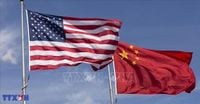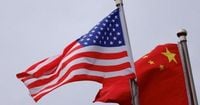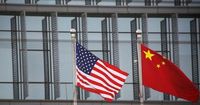On May 5, 2025, global markets reacted to conflicting signals regarding U.S.-China trade negotiations. President Donald Trump stated that the U.S. was "not ready" to negotiate with China, while the Chinese Embassy in Washington confirmed that both nations would meet in Switzerland on May 9 to restart trade talks. Observers suggest this meeting is more of a strategic maneuver than a breakthrough, advising investors to temper their expectations for immediate results.
The backdrop for these negotiations is a recovering U.S. economy, particularly in the service sector, which constitutes over 70% of the country’s GDP. Recent data showed the ISM Services PMI for April at 51.6, surpassing expectations and indicating strong consumer resilience. This economic strength allows Washington to adopt a firmer stance without immediate repercussions. Conversely, China is under greater pressure due to weak domestic growth, particularly in personal consumption and real estate, along with slowing exports affected by U.S. tariffs and a shift in supply chains to countries like Vietnam, Mexico, and India.
Analysts believe that China's willingness to engage in negotiations is a tactical move to break isolation rather than a sign of substantive concessions. Washington is seen as prolonging negotiations not because it lacks a desire for a deal, but to maximize strategic advantage ahead of the 2026 presidential election.
Switzerland, known for its neutrality, has been chosen as the meeting location to "refresh" the atmosphere and avoid the pressures of domestic political scrutiny. However, the recent statements from Trump, criticizing China’s trade practices and threatening additional tariffs, indicate that the U.S. will continue its "maximum pressure" strategy. If the May 9 meeting is merely an opening, concrete results may not materialize for at least one to two weeks. Nevertheless, the mere act of sitting down together could help ease tensions and stabilize financial markets.
Investors are advised to shift their focus from short-term indicators to the political motivations behind these negotiations. Specific strategies include maintaining a high allocation to gold and silver, increasing exposure to U.S. domestic service stocks—especially in healthcare, retail, and AI—and monitoring the Chinese Yuan and stock indices for signs of positive expectations from the negotiations. Additionally, caution is advised regarding industrial commodities like copper, aluminum, and zinc, which may be impacted if China’s industrial production continues to decline due to trade instability.
Many investors remain hopeful that these negotiations will lead to a swift agreement similar to the one reached in 2019. However, the current geopolitical context has shifted significantly. The U.S. is no longer merely seeking a trade agreement but is pursuing a long-term strategy to contain China, while China is unlikely to make significant concessions, particularly in areas like technology, state subsidies, and supply chain competition.
The upcoming meetings represent the first official, public contact between high-level officials of the two largest economies in the world aimed at easing trade tensions that could negatively impact global growth. The U.S. delegation will include Treasury Secretary Scott Bessent and Trade Representative Jamieson Greer, with meetings scheduled for May 10 and 11 to lay the groundwork for future negotiations.
In a recent appearance on Fox News, Secretary Bessent emphasized that the primary goal of this round of negotiations is to "de-escalate" tensions rather than to reach a comprehensive trade agreement. He acknowledged the need to reduce tensions before any further progress could be made, stating, "We have to de-escalate first, then we can move forward." Meanwhile, the Chinese Ministry of Foreign Affairs has confirmed that Vice Premier Ha Lap Phong will represent China at these meetings.
This high-level interaction marks the first since Chinese Vice President Han Chinh attended Trump’s inauguration in January. Bessent has expressed a desire to rebalance the international economic system to better serve U.S. interests, framing the discussions around how to de-escalate rather than focusing on major trade agreements.
A spokesperson for the Chinese Ministry of Commerce remarked that if the U.S. seeks to resolve issues through negotiations, it must recognize the serious negative impacts of unilateral tariff barriers on both itself and the global economy. Chinese state media reported that Beijing’s decision to engage in talks was influenced by global expectations, China's interests, and calls from U.S. businesses.
As the trade war has caused turmoil in financial markets and triggered global shockwaves, experts anticipate that these negotiations may last several months. Deborah Elms, Head of Trade Policy at the Hinrich Foundation, stated, "You have to start somewhere, so I don’t say it’s not worth it. Just that it may not meet everyone’s expectations initially." Similarly, Henry Gao, a law professor at Singapore Management University, predicts that the negotiations could extend for several months or even over a year.
In conclusion, while the upcoming talks in Switzerland may provide a glimmer of hope for easing tensions, they are unlikely to yield immediate results. The U.S.-China relationship remains fraught with challenges, and both sides appear poised for a prolonged engagement rather than a swift resolution. Investors should remain vigilant and prepare for a complex landscape as these two economic giants navigate their contentious relationship.






